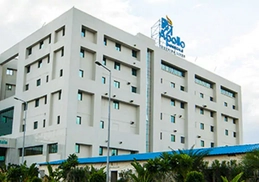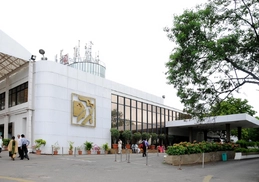
+91 8095511877

+91 8095511877
A brain tumor is an abnormal growth of cells in your brain. It may be cancerous or non- cancerous. There are different types of brain tumors, according to the cells they originate.
The two main types are primary and secondary brain tumors. Primary brain tumors originate from the cells of your brain. Secondary brain tumors are cancers that have spread from other parts of your body.
Brain tumors can cause a wide range of symptoms. The symptoms usually depend on the size, location, and type of tumor. An MRI scan of the brain will help to detect a brain tumor. You will need a biopsy to know the type of tumor as well as its nature.
Surgery is the most common treatment for a brain tumor. Radiation therapy, chemotherapy, targeted therapy are also other treatment options. The success of the treatment will depend on the type and grade of the tumor.
The symptoms vary with the type and location of the tumor. Some of the main ones are
Headaches- Headaches are very severe. It tends to get worse with activity as well early in the morning
Seizures- In some, this will be the first sign of the tumor. There will be convulsions with or without loss of consciousness
A change in personality- A change in personality and behavior can occur due to a brain tumor. Getting irritated very quickly, a sudden change in mood, etc. are some of them. These occur due to the pressure or irritation of some parts of the brain by the tumor.
Memory issues- You may find it difficult to recall the names of people and things. Short-term memory loss is also widespread.
Feeling of confusion- You may find it difficult to plan things as well as feel distracted.
Nausea and vomiting without a reason
Feeling tiredness and drowsy
Difficulty in performing daily activities including walking
Primary brain tumors occur when some cells in your brain divide uncontrollably. What exactly causes this not very clear. Your brain cell may undergo some changes in their genetic structure, making them divide faster.
Secondary brain tumors are cancers that spread from other parts of your body. Cancer of the lung, breast, liver, kidneys, etc. is more likely to spread to the brain.
Brain Tumor Risk factors
Some factors increase your risk of getting brain tumors. Some of them are
Your age- Brain tumors are more common in the elderly and children
Family history- If anyone in your immediate family has a history of brain tumors, you are at risk
Exposure to radiation- If you have a history of exposure to radiation, your risk increases significantly
If you have any of the symptoms of a brain tumor, your doctor will suggest a few tests. The common ones are
Brain MRI: MRI brain would done along with contrast.A brain MRI with contrast gives a very good idea of the tumour. It helps to get the size, site, spread, surrounding structures and the type of the tumour.
Brain tumours are of two types – Benign or Non cancerous and Malignant or Cancerous. The confirmation of the type is done by Biopsy. Unlike tumours of other parts of the body, in brain, the biopsy is mostly done along with surgery.
Your treatment will depend on whether your tumor is cancerous or not.
Benign brain tumors do not grow as fast as cancers. Also, they do not spread to other parts of your body or come back after removal. Your symptoms occur according to the size, type, and location of the tumor.
Small tumors are best left alone. Your doctor will ask you to have periodic MRI scans to know whether it is growing in size.
If your tumor is large, your doctor will consider surgery to remove it altogether. If surgery is not possible, you will have radiation therapy to shrink the tumor. It will help to reduce the symptom that you will have.
Surgery is the most common treatment option for brain tumors. Your surgeon will look into some factors before surgery. These include the size, shape, location, and the possibility of the spread of cancer.
The goal of brain tumor surgery is to remove the tumor completely. If this is not possible, the surgeon will remove as much of the tumor as possible. During operation, the surgeon will be careful to avoid any harm to the surrounding tissues. If the location of the tumor is in a critical area, the surgeon will weigh the benefits against the possible risks.
Apart from tumor removal, you may also have surgery for the following reasons :
To place a shunt to reduce intracranial pressure, if the tumor is in the ventricles of the brain
If the tumor is in one of the critical areas of the brain, internal radiation or chemotherapy are treatment options. In this, the surgeon will place a radioactive source near the tumor with the help of a surgery.
A craniotomy is the most common surgical option.
The surgeon will expose the area of your brain, having the tumor through an opening in the skull bone. Through this opening, the surgeon will remove the tumor. Before the surgery, you will have an MRI of the brain. A functional MRI shows the activity in your brain while doing specific tasks. It helps the surgeon to avoid critical areas of the brain during surgery.
You will have general anesthesia during the surgery. Once you are asleep, the surgeon will make a small incision on your scalp to expose the skull bone.
The next step is to make an opening in the skull bone with the help of a bone drill. Your surgeon will carry out the surgery through this opening. If the tumor is small, the surgeon will remove it altogether.
The next step is to close the opening in the skull by replacing the cut off skull bone in position. Wires or screws will help to keep it in place.
If there is any part of the tumor remaining, you will have radiation or chemotherapy to destroy it.
Neuroendoscopy- This is minimally invasive brain surgery to remove certain types of brain tumors
Trans-sphenoidal surgery- In this surgery, the surgeon will remove some brain tumors like pituitary tumors through the nasal opening.
Stereotactic radiosurgery- It is not a surgery, but a type of radiation therapy. Here, the radiologist will pass low-intensity radiations from different directions towards the tumor. These radiation beams join precisely on the tumor to destroy it. The advantage is that the low-intensity radiation does not cause much harm to normal brain tissues as it passes through them
You will have radiation therapy if;
Radiation aims to destroy all remnants of the tumor after surgery. Internal radiation therapy is an option for some brain tumors.
You will have chemotherapy
The chemotherapy treatment will be orally in the form of tablets. The drug reaches the tumor through the bloodstream and destroys it


This article has been reviewed for medical correctness and relevance by
Dr. Gurneet Singh Sawhney
Dr. Gurneet Singh Sawhney is a Consultant Neuro and Spine Surgeon in Fortis Mulund, Mumbai. He has special interests in Functional Neurosurgery and Epilepsy Surgery. His skills also include Neurooncology including skull base and deep seated tumours, Neuroendoscopy procedures including Endoscopic pituitary surgery, Vascular Neurosurgery and AVM surgeries. He is highly experienced in stereotactic, seizure and functional neurosurgery, managing Neurotrauma, complex spine cases including CVJ and emergency neurosurgeries. He was also awarded as The Most Promising Neurosurgeon in Maharashtra - 2016". """

Apollo Bangalore

Apollo Chennai

Apollo Health City

Apollo Indraprastha

Fortis Mulund

KIMS Hospital Hyderabad
Frequently Asked Questions
What are the first symptoms of brain tumors?
Are brain tumors curable?
How to diagnose a brain tumor?
What is the best treatment for brain tumors?
What is the cost of brain tumor treatment in India?